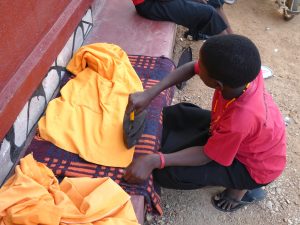It is with great sadness that we heard today of the death of our dear friend Josh Kutchinsky. It is a huge loss to us all.
Josh played an extremely valuable role as a founding Trustee of Uganda Humanist Schools Trust, where he represented the British Humanist Association. We were together in Uganda in 2008 for the IHEU East African Humanist Convention. He spoke with passion and thoroughly enjoyed visiting, with his wife Ginnette Ashkenazy, the Humanist Schools in Uganda. I remember with some hilarity his extravagant dancing to accompany the student singers and dancers at one of the schools (wish I could find the video!?).
I helped Josh and Ginnette to plan a memorable safari tour of the Uganda National Parks, which was gruelling, given the poor roads at that time, but they found it life enhancing. I recall Ginnette recounting an encounter with a hippo as she tried to make her way from her tent to the toilet block near Lake Mburo.
Josh embraced social networks and set up and ran the Hummay platform for many years. Through Hummay, Josh provided a way for Humanists across the world to network, and gave those, particularly in Africa, a voice on the world stage.
Josh had an acute sense of fairness and social justice and this motivated everything he did. He had a house in France and was a committed European, fighting to the very end the folly of Brexit. Ginette was the love of his life and I know he supported her hugely in writing her very moving autobiography and in her wonderful artistic career, both of which were a great source of pride to him.
Josh will be sorely missed. He will be remembered fondly by us all for his profound humanity.
Here is the latest podcast be Kate Lovelady, leader of St Louis Ethical Society, which has raised substantial funds to support the Humanist Schools in Uganda.
The podcast of Kate’s annual appeal of 2017 to support the Uganda Schools is at <https://ethicalstl.org/category/podcast/>, specifically on December 3, entitled:
Much of the material for the address is taken on the UHST website, and this year several photos from the UHST website were included. The address is always given on the first Sunday of December and is followed by our “First Sunday Lunch” which in this case is a “typical Uganda school lunch,” created from recipes we’ve found online. Fee for the lunch is “donation only,” and those donations together with commitments from several members to support a partial or entire scholarship on their own constitute our fundraising effort for the year
Posted: January 23, 2018 by Steve Hurd
Josh Kutchinsky dancing
Here is Josh dancing at the Humanist School in Uganda:
Happy memories
Steve Hurd
Posted: January 23, 2018 by Steve Hurd
Sad loss of Josh Kutchinsky
It is with great sadness that we heard today of the death of our dear friend Josh Kutchinsky. It is a huge loss to us all.
Josh played an extremely valuable role as a founding Trustee of Uganda Humanist Schools Trust, where he represented the British Humanist Association. We were together in Uganda in 2008 for the IHEU East African Humanist Convention. He spoke with passion and thoroughly enjoyed visiting, with his wife Ginnette Ashkenazy, the Humanist Schools in Uganda. I remember with some hilarity his extravagant dancing to accompany the student singers and dancers at one of the schools (wish I could find the video!?).
I helped Josh and Ginnette to plan a memorable safari tour of the Uganda National Parks, which was gruelling, given the poor roads at that time, but they found it life enhancing. I recall Ginnette recounting an encounter with a hippo as she tried to make her way from her tent to the toilet block near Lake Mburo.
Josh embraced social networks and set up and ran the Hummay platform for many years. Through Hummay, Josh provided a way for Humanists across the world to network, and gave those, particularly in Africa, a voice on the world stage.
Josh had an acute sense of fairness and social justice and this motivated everything he did. He had a house in France and was a committed European, fighting to the very end the folly of Brexit. Ginette was the love of his life and I know he supported her hugely in writing her very moving autobiography and in her wonderful artistic career, both of which were a great source of pride to him.
Josh will be sorely missed. He will be remembered fondly by us all for his profound humanity.
Steve Hurd
Chair
Uganda Humanist Schools Trust
Posted: December 23, 2017 by Steve Hurd
St Louis Ethical Society Podcast
Here is the latest podcast be Kate Lovelady, leader of St Louis Ethical Society, which has raised substantial funds to support the Humanist Schools in Uganda.
Society, which has raised substantial funds to support the Humanist Schools in Uganda.
The podcast of Kate’s annual appeal of 2017 to support the Uganda Schools is at <https://ethicalstl.org/category/podcast/>, specifically on December 3, entitled:
What wonders we can achieve together
Much of the material for the address is taken on the UHST website, and this year several photos from the UHST website were included. The address is always given on the first Sunday of December and is followed by our “First Sunday Lunch” which in this case is a “typical Uganda school lunch,” created from recipes we’ve found online. Fee for the lunch is “donation only,” and those donations together with commitments from several members to support a partial or entire scholarship on their own constitute our fundraising effort for the year